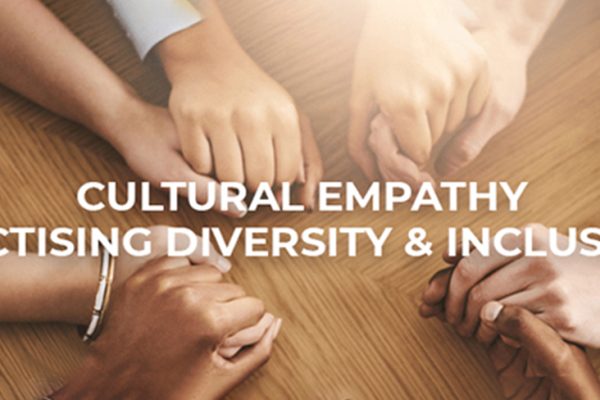June has officially ended and summer is in full swing. Today, I want to talk about cultural empathy and how we need to be aware of the concept while living in a multicultural environment. But before we do that, let’s delve into the weekly inventory check.
Weekly Inventory Check:
Another month has ended and that calls for reflection on past events, assessing successes and failures, and identifying areas for improvement. Following this evaluation, it’s time to set goals for the upcoming month and engage in a continuous cycle of refinement and dedicated practice. In other words, iterate and reiterate — expressed by writing. Write down your goals for this month, rinse and practice, practice and practice.
Cultural Empathy
Last week, I found myself facing a challenge in my university classroom where I teach data science. We had a group project assigned randomly, meaning the students didn’t have a choice in selecting their team members. While this approach had its advantages and disadvantages, I explained to them that it would provide an opportunity to learn how to collaborate with people they may not know or like, as this is a valuable skill in life.
The class consisted of 20 students, representing 18 or 17 different nationalities, making it a diverse group. In one particular group, there were two Bangladeshi students and one Nigerian student who were expected to work together. Unfortunately, the Nigerian student did not mix well with the other two so he left on the day of the presentation saying that he did not understand what exactly was happening as he was not present the day before to work on the presentation. And therefore, he requested for a retake, which was not really a policy given that he did not even contribute on it in the first take. Amongst the other two students, one also didn’t contribute significantly but was present throughout the presentation while the other Bangladeshi student was actively involved in the project and basically running the show.
As a result, the hardworking Bangladeshi student earned the points he deserved, while the rest of the group faced questions about their effort. This hardworking Bangladeshi student, who also happened to be mature and older than the other two, expressed dissatisfaction towards the Nigerian guy. He felt it was unfair that their peers received the same marks despite not contributing as much. This predicament left me unsure of how to handle the situation.
After careful consideration, I decided to allocate points based on individual contributions. The Bangladeshi student who actively participated received the points he deserved, while the other group members who didn’t contribute much received reduced points. One of the students who was present throughout the project and the presentation received half the points, acknowledging his presence and willingness to participate. However, the student who didn’t show up and expressed no interest in being part of the project received a zero.
Later, the student who received zero approached me, questioning why the other student received 15 points while he received none. I explained that their lack of involvement and disrespectful behavior towards the hardworking student contributed to their score. It was the Nigerian student. He argued that he was simply annoyed by the lack of assistance and that the Bangladeshi student was not letting him participate and was lying about the whole situation. On the contrary, Bangladeshi guy debated that the Nigerian guy was giving excuses to participate and was being extremely disrespectful by lashing out on him. This argument made me realise how two people were thinking and perceiving things differently. For one person, respect meant the most, and for the other, truth mattered more. And all that was happening was a clash between their own versions of the truth.
The Bangladeshi student, coming from a society where respect is highly valued and being older than the other students, expected a certain level of respect from their peers. He also felt that his efforts deserved recognition. The Nigerian student, however, maintained that he was not being disrespectful. It was just the way he talked and all that he was doing was explaining his perspective. As the teacher, I recognized that this conflict stemmed from differences in cultural norms rather than personal animosity.
Cultural empathy extends beyond collaboration and relationship building; it serves as a crucial aspect of general empathy. Empathy entails understanding people from their point of view and appreciating the unique circumstances that shape their lives. Cultural empathy delves deeper into the cultural aspects of an individual’s background, including the society they were raised in and the values they hold. By practicing cultural empathy, we ensure that our expectations, perceptions, and interactions with others are inclusive.
It is essential to grasp that people come from diverse walks of life and that we must remain open to understanding their perspectives. By doing so, we can bridge the gap, solve conflicts, nurture relationships, and build trust. Failure to understand one another’s viewpoints only perpetuates impasses. Developing cultural empathy is therefore crucial.
Another significant use case of cultural empathy is understanding individuals who may differ in appearance from ourselves. The rise of far-right movements in the Western world, which express opposition to immigrants, often stems from a lack of willingness to comprehend the perspectives and origins of those immigrating. Instead of appreciating the cultural richness and value they bring to our societies, we tend to focus solely on perceived threats to our own culture, values, and nation. However, fostering an inclusive society does not lead to the erosion of our identity; rather, it adds value and enriches our communities. Every immigrant brings his unique experiences and expertise, which can contribute to the progress and development of their adopted country. It is crucial for individuals holding anti-immigrant views, particularly those on the right, to embrace empathy and let go of the lens of opposition and cultural resistance. By recognizing the importance of diversity, we can unlock the potential for human advancement and understand that there is nothing wrong with embracing more diverse perspectives.
So what really happened with the students? The Nigerian student was told how it’s not normal to lash out like that and express his anger just like that because that’s not how people behave – they don’t scream or be loud around people they don’t know. It’s important to understand where his peers are coming from and to show certain level of respect who might not understand your culture yet. However, he was given an opportunity to have a retake as an individual assignment so that he could not mooch off another students’ points. The hardworking Bangladeshi guy got the marks that he deserved and wanted and the other Bangladeshi also got to pass the presentation as he was not a troublesome kid and let the other person take the lead.
Want More?
Cultural Empathy is a very important concept but practising it is as hard. Learn why.
This article explains how on one side, empathy plays a role in welcoming immigrants against those who are not engaging in perspective taking.
This article explores the integration of cultural teaching in English as a Foreign Language (EFL) instruction, specifically emphasizing the development of cultural empathy among Chinese learners. The article begins by examining the importance of intercultural empathy and providing fundamental concepts related to this topic. It then delves into an analysis of the challenges that Chinese learners face when attempting to cultivate cultural empathy. Lastly, the article proposes practical suggestions and techniques to support the development of cultural empathic abilities in this context.
Read of the Week
A book called Inclusive Cultural Empathy: Making Relationships Central in Counseling and Psychotherapy by Paul B Pedersen offers valuable guidance on assisting clients in exploring, discovering, and harnessing the internalized voices of their cultural teachers. These voices shape our understanding of our identity and provide insights on resolving personal challenges.
Thoughts to Leave you With
We are excited to announce the official launch of our podcast! As you may have read in our recent newsletters, we have been working on creating a platform to make difficult conversations easier. Starting next week, our podcast will be released every Friday at 12:00 p.m. Central European time. Each episode will feature a rotating team of co-hosts who will help navigate challenging topics and explore effective ways of discussing them. We invite you to join us on this journey and look forward to your participation. Please follow, subscribe, and join us on various platforms. Throughout the week leading up to the podcast launch, we will be sharing sneak peeks. Additionally, this newsletter will transition into a supplement for the podcast, providing episode summaries and offering further readings to deepen your understanding of the topics discussed. We appreciate your continued support and engagement.


